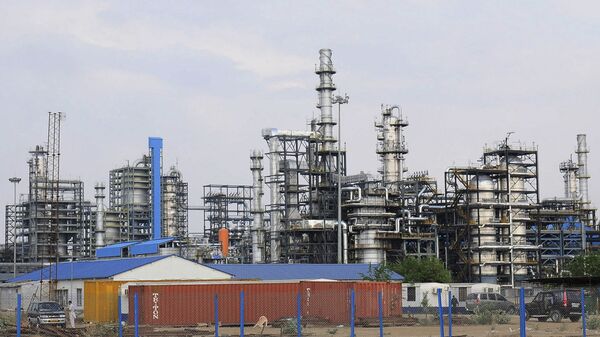New Delhi (Sputnik) — India increased imports of crude oil from Venezuela to almost double the average quantity in the first half of this month as per data compiled by Bloomberg.
That Bloomberg data suggests that Venezuela shipped around 620,000 barrels a day in the first half of the month which is more than double India's Venezuelan oil purchase of 300,000 barrels a day. Indian refiners Reliance Industries Ltd and Nayara Energy Ltd, which are major buyers of heavy crude, are driving forces behind the import quantity hike.
India has made it clear, despite US warnings, that commercial considerations and related factors will determine the value of trade with Venezuela. India's Ministry of External Affairs has however not specified any payment mechanism in view of the uncertainty arising out of the US-imposed sanctions on Venezuela's state-run energy provider PDVSA in effect from 28 January to put pressure on President Nicolas Maduro to resign.
"We have conveyed our position in this matter (to Venezuela) that we do not have any barter system with Venezuela and also as and a when a decision to import oil from any country is concerned we will of course take into account the commercial factors in that decision", Raveesh Kumar, spokesperson for India's Minister of External Affairs said on February 14, a day after US National Security Advisor John Bolton warned countries and companies against buying crude oil from Venezuela. This came after the Latin American country's Oil Minister Manuel Quevedo announced during a surprise visit to India that Venezuela wants to sell more oil to the fast-growing Indian market.
On 15 February, India took steps to placate the US and finalised a term contract for import of up to 3.0 million metric tonnes of US-origin crude oil as a part of its strategy to diversify term crude sources.
"The approximate value of the contract works out to $1.5 billion. This is the first term contract finalised by any Indian PSU oil company for import of US origin crude oil grades", a statement issued by Indian Oil, the country's biggest state-owned refiner, reads.
This is the second contract signed by the state-owned firm after one that was signed last August under which it was agreed to purchase 6 million barrels of US oil between November to January. India Oil Chairman Sanjeev Singh said that the annual contract will begin from April this year. Indian public sector refineries started importing crude oil from the US in October 2017.
That Indo-US trade balance was on the losing side against the US had been an eyesore in the eyes of US administrations. With India taking steps to offset this through oil imports it is expected that the deficit would be brought down over the years. Indian exports to the US in 2017-18 stood at $47.9 billion, while imports were at $26.7 billion.
According to a source from the Indian Petroleum ministry, India's approach towards US sanctions indicates that it will seek a waiver on Venezuela; similar to the Iranian oil purchase. However, as the deadline for the waiver period approaches, imports of Iranian crude slowed down to 270,500 barrels per day in January. Despite sanctions, India continued the import of Iranian oil to the tune of around 500,000 barrel per day and has already crossed the total annual volumes of 2017-18. Indian officials are working with their Iranian counterparts to find a way to minimise the impact of unilateral US sanctions beyond April as well.
During Iranian President Hassan Rouhani's visit to New Delhi in February 2018, India had agreed to raise Iranian crude oil imports to around 25 million tonnes during the current fiscal year (April 2018- March 19) in comparison to 18.5 million tonnes in 2017-18. In 2016-17, India had imported 25.5 million tons of crude oil from Iran.
Venezuelan opposition leader, Juan Guaido escalated Venezuela's political crisis last month by declaring himself interim president, with US support, which prompted Maduro to accuse Washington of trying to orchestrate a coup. Russia, China, Mexico, among other nations, have reaffirmed their support for Maduro as the country's only legitimate head of state and called for dialogue. In addition, the United Nations also still recognises Maduro as Venezuela's president.


